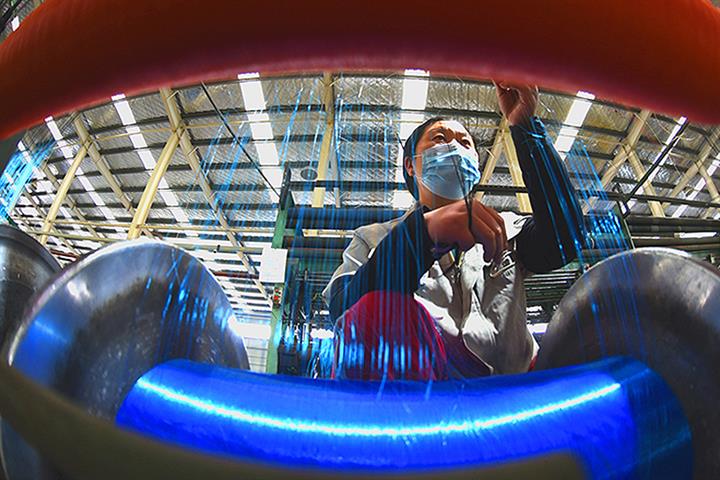 Chinese Textile Firms Forego Vietnam-Made Despite Profit Squeeze
Chinese Textile Firms Forego Vietnam-Made Despite Profit Squeeze(Yicai Global) June 10 -- Chinese clothing manufacturers are trusting their advantages over rivals in Southeast Asia and Africa despite the rising costs and intensifying competition.
Foreign clients are "still quite willing to give us orders" as they regard Chinese suppliers as good, fast and cheap, said Cao, owner of a domestic plant that mostly makes garments for an international clothing brand, said to Yicai Global.
But Cao said she has been stressed out in recent years as increasing business volumes have failed to boost revenue. "This made me realize accelerated transition is necessary."
Nurturing business relationships is key. Cao's firm has been communicating with overseas clients, actively dealing with the changes. "And now there has been a sign that orders are beginning to return."
But the competition and soaring raw material costs are shrinking gains. "We don't talk profits when negotiating with international clients because of the recent margin squeeze," said Chang, owner of a underwear and infant clothing manufacturer in southern China.
"Instead, we only talk about expected losses, and are willing to take orders at a loss between 1.5 percent and 2 percent in order to save both valuable clients and our skilled workers, assets that are not easy to recover once the factory is closed for a while," added Chang.
But buyers are always looking for cheaper alternatives. "A big foreign client canceled a large order worth over CNY100 million (USD15 million) for the upcoming Christmas season because it found an alternative in Vietnam," Chang added, the order equals 40 percent of the company's annual business. He snatched the client from an Indian rival back in 2017.
"Our overseas clients are largely big supermarkets in the United States, Canada, and Australia," said Chang. "Given that the number of clients is basically fixed, the order is either yours or mine."
China has its advantages. Manufacturers in Southeast Asia are still a bit inferior regarding equipment, techniques, labor skills, and other so-called "hard and soft conditions," according to Cao.
Chang has visited Vietnam several times to learn about local conditions. Vietnam has become less willing to attract textile and other conventional industries in recent years. Meanwhile, skilled workers' monthly salaries have risen to almost CNY4,500 (USD673.2), which is not low, according to Chang.
Another option is Africa. Some overseas clients have been suggesting Chang to set up production in Africa, even accepting a 10 percent price increase, said Chang. "The problem is the drawbacks outweigh the benefits." After visiting several countries in the continent, Chang said that the low labor costs are not enough to offset the tight power supply, and inferior transport and raw material supply capabilities.
Editors: Tang Shihua, Emmi Laine, Xiao Yi